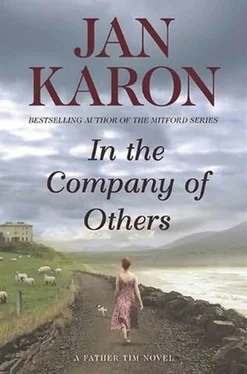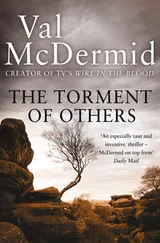They left the bedroom at half-past twelve and went across the hall to the kitchen. He carried the hamper and the tablet of heavy paper with its cunning textures, and the flashlight Seamus was borrowing from Broughadoon. His wife was spent, but encouraged by the morning’s work.
‘There you are!’ said Seamus, wracking his mustache with the comb.
‘She liked it,’ said Cynthia.
‘God bless ye! I’m hopin’ she’ll take a soft egg with toast now.’ The erstwhile butler of Catharmore was beaming, a schoolboy.
‘She’s a wonderful, frightening, courageous woman-it will be good to have another chance tomorrow.’
‘Strong tea,’ said Seamus, pouring. ‘And quiche, just out of the oven. Real men are no longer afraid to eat it, isn’t that so, Rev’rend?’
‘Absolutely.’
‘Sit up to the counter, then, an’ tuck in. I’ve made fries for us.’
‘Fries!’ said Cynthia. ‘I love fries. And you’re good to take us to the basement afterward.’
‘We’ll go out th’ back with no steps, and down th’ bank with its easy grade to th’ lower quarters.’
‘We’re wanting to see Dr. O’Donnell’s surgery, ’ she said, ‘and where he kept his medical library, and of course the concealed room, as he calls it, which he set aside for quarantine. You really must read the journal, Seamus, it’s all about this place and the terrors of the old days.’
Seamus served the plates. ‘I don’t know of a concealed room, an’ God knows, we’ve terrors enough these days.’
They laughed, and blessed the food and asked God’s peace upon all life within the borders of Catharmore and Broughadoon, and Fletcher called for the egg and toast, and they felt the small triumph, and a certain peace.
Then, out the back way and down the slope to a badly neglected basement door, swollen with age and damp. He carried the Broughadoon flashlight; Seamus carried a ring heavy with keys.
‘Since th’ painting went missin’, we’ve been keen to lock up.’ The rasp of the latch; Seamus tugged at the door, tugged again-it opened to the smell of all basements situated near water.
‘Not a pretty sight,’ said Seamus. ‘Keep your eyes skinned an’ watch your step.’
Cynthia peered into the chiaroscuro of moldering plaster and limestone. ‘This is the only door to the basement?’
‘’t is.’ Seamus switched on the overhead bulb.
‘Then the patients would have come into the waiting room here…’ She stepped inside. ‘But what a very small room. What do you think, Timothy? Could Edema and Goiter and all the rest have squeezed in here?’
‘Owners change; walls get knocked down, new ones put up.’
‘I think this may be it, it feels right,’ she said. A narrow window, the sill crusted with dead flies; walls blackened by damp.
‘That door should open to the surgery,’ she said.
Seamus moved ahead and opened it, and ha! the old fireplace-still there after so many years, and the two windows ‘always kept open in summer.’
‘Here would be the examining table,’ she said, ‘with the little stool beneath, and there would be the table where he kept the skull that Aoife tricked out with the nurse’s cap.’
His wife was entranced, jubilant, the cheapest of dates.
A stash of windows with broken panes, an open box of men’s dress shoes gone green, wooden crates, a headboard with peeling veneer. Heaven knows what bacillus festered here. He covered his nose with his handkerchief, a wimp in the face of venture and discovery, while she explored cracks in the plaster, the cold hearth, the wasted hole of the fireplace.
They moved along to a room with windows protected by iron bars. He helped her navigate the uneven floor tiles.
‘The bars?’ he asked Seamus.
‘To keep thieves out of th’ coal, they say. There was where th’ chute came down.’ Seamus pointed to what was undeniably a pile of coal. ‘’t was here when we arrived fifteen years ago; we may be near to a time of needin’ it.’
‘So Paddy did no remodeling to the basement?’
‘None at all, save for th’ heating system an’ new plumbin’. You’re seein’ these quarters with their original fabric, as th’ historians say-overhead beams, original; limestone floors, original; walls an’ damp, original.’
They were passing along a narrow hall, lighted by a single bulb that swayed from the pull of the chain. Shadows danced over the stone.
‘O’Donnell hid the door to the room with a bookcase,’ she said. ‘I can’t imagine a rolling bookcase would still be sitting around down here. But the room was along a hall, he said. Is this the only hall?’
‘Ah, no, there’s a bloody warren of halls an’ rooms, all kept locked in those days. This room for th’ cider an’ that for th’ potatoes, this for th’ laundry tubs, that for th’ general storage of pecularities.’
‘Such as?’ she said.
‘Such as a human skull with yellow teeth, an’ a wicker wheelchair with a sheep bell attached. Then there’s th’ mannequin used for sewin’ ladies’ clothes-which you don’t want to come on in th’ dark.’
‘Have you ever seen a bookcase down here?’
‘Not that I recall.’
‘So it’s a matter of finding the right door,’ she said. ‘It was a small room with a window, holding just two cots and a table. Dr. O’Donnell and his wife were very proud of the quarantine room-we’re just reading about it.’
Seamus stopped at a door long ago brushed with blue paint. ‘This was Mr. Conor’s storage for his fishing tack. He didn’t leave it at Broughadoon out of season, they say, for there’d been a theft or two.’ Seamus tugged at the door, scraping it along the flagstone. ‘But there’s no window in here, nor any bulb, either, you must go in with a torch to see your hand in front of your face.’
The flashlight shone on piles of waders, boots, rods, vests hanging on nails. There was the distinct, though faint, smell of fish.
They moved along to other doors. Behind one, a toilet for servants, dark as a cave. Behind another, shelves of moldering books, accordion files, accounting ledgers. He was the only one to spot whatever fleet, dark thing fled the nest of literature and commerce.
‘Now, here’s one with a window!’ said Seamus. ‘’t is where th’ boys’ childhood things are stored.’
In the grainy light from a small window, a small room filled with two bicycles, bedraggled; a wooden wagon without wheels; bunk beds piled with twin mattresses; fishing gear; a basketball net on a bent ring; a large box labeled TRAIN; a hat rack with ball caps embalmed in dust. Leaning against the beds, a stack of window louvers, many slats missing, and at their rear, a glint of something that wasn’t a louver. He stepped in and shone the light on it, and Seamus was quick to move the louvers, one by one, away from the ornate gold frame.
In the beam of the flashlight, they saw the fisherman in the boat, and the mountains beyond, and the small cottage with its plume of smoke, and the swan on the morning lake.
Anna had brought in an extra chair, opened the windows to an August breeze.
He’d told Anna they had important news, yet dropping a bomb into a tea party in Ibiza wasn’t his cup of Earl Grey.
Cynthia took lemon, a cube of sugar, stirred, set down her spoon. ‘The Barret,’ she said to Anna, ‘is at Catharmore.’
‘Catharmore?’
‘We saw it today in the basement, in a storage room.’
‘But that means… Paddy.’
‘We thought you should tell Liam,’ he said. ‘You’ll know best how to handle such news.’
‘In a storage room?’
‘Where the boys’ childhood things are kept,’ said Cynthia. ‘Among a stack of louvers.’
Читать дальше












